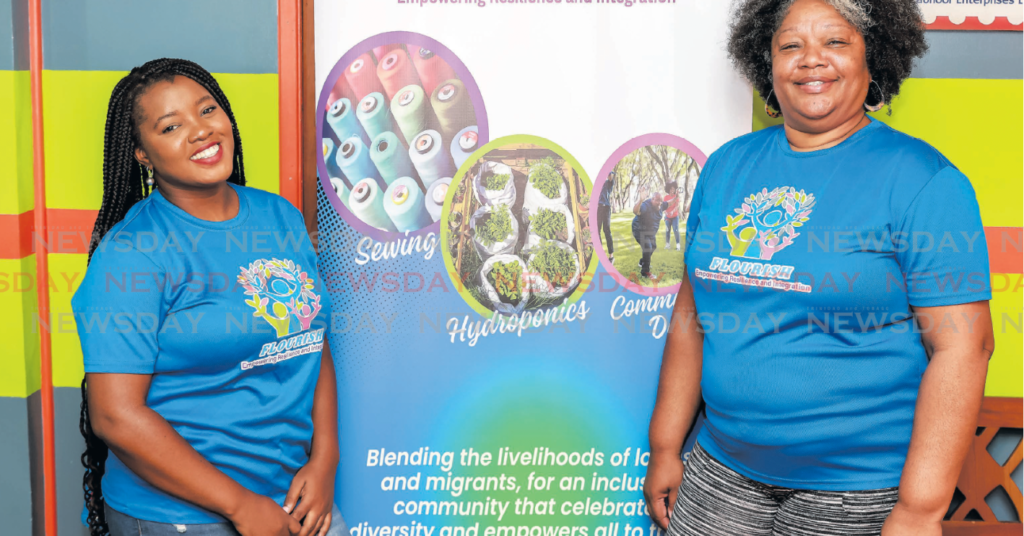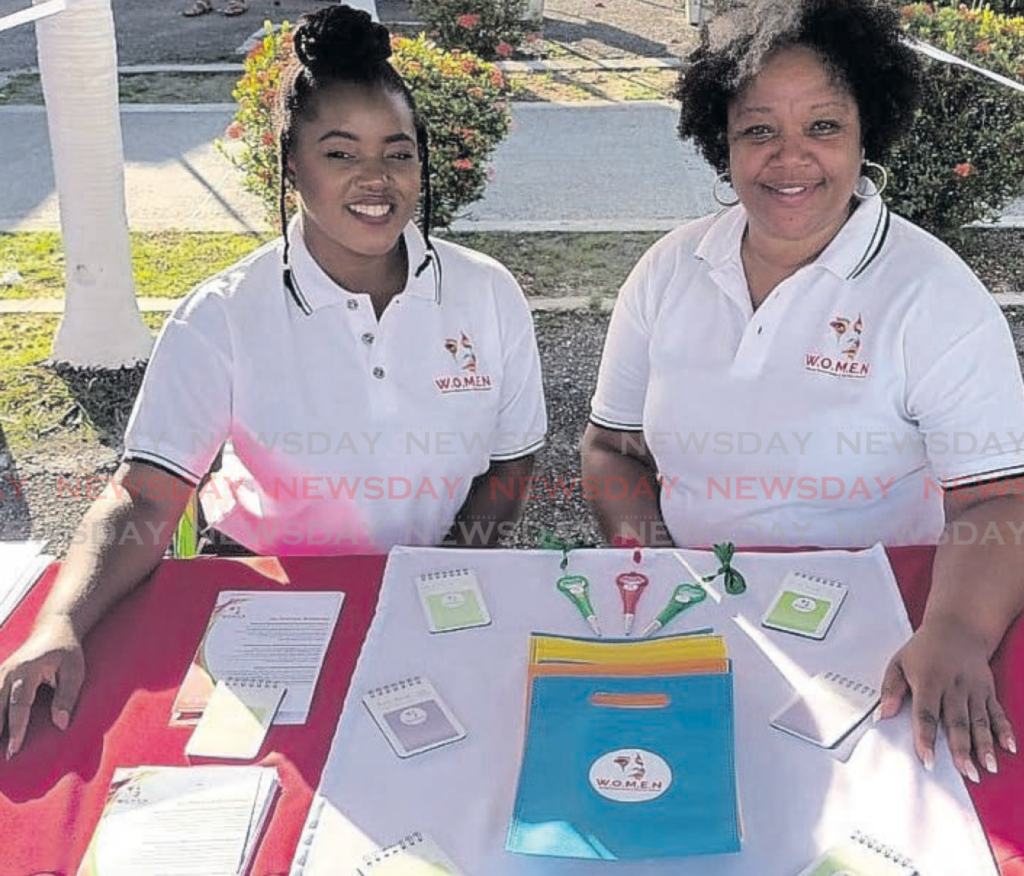NGO founders launch integration project for locals, migrants

Lucia Cabrera Jones, head and co-founder of the Women-Owned Media and Education Network (Women), said she understood the influx of Venezuelans entering Trinidad and Tobago a few years ago was disruptive for the country, but it was necessary to look at the “root cause” and adapt.
“We have to understand these people are running and nobody runs from good. Nobody wants to leave the comfort of their home and go into the unknown where you don’t know if you will be welcomed.”
Getting people to understand and accept each other was just one of the reasons Jones and Women co-founder Jayme Hoyte started the NGO and continued to provide training for both migrants and locals.
Jones said she and Hoyte had been working with women separately, but decided to combine their expertise and passion to take their work to another level.
When they formed Women during the pandemic, the aim was empowerment, equity, to build the capacity of women so they became self-reliant, and other similar ideals.
They registered the NGO in 2022.
“But we decided it could not just be about the women without the input of men. We need them alongside us. So we need to sensitise the males with the struggles that women go through, we need to show them we really need them in a different capacity, we need them as support.”
Women’s latest programme was Flourish – Empowering Resilience and Integration, sponsored by the International Organisation for Migrants. It is an integration programme bringing together migrants and residents of local communities.
“The main objective is to promote integration at community levels. We are doing so through skill-building, having both migrants and locals learn and work together.”
Every Saturday from March 2-April 1, ten migrant females and ten local females, and five migrant males and five local males participate in the skill programmes in sewing and hydroponics. But there were also entrepreneurship and financial-literacy workshops, as well as integration and xenophobia workshops.
“We want to educate both populations as to what is xenophobia and break down the stigma. Some people make xenophobic statements and have xenophobic behaviour and they don’t even know, feeling like they are being nice to people. In this programme we try to teach people how to deal with it and break those barriers.”

Jones said Women chose to host the programme in Enterprise, Chaguanas, as there was a heavy presence of migrants in central Trinidad. And, at the end of Flourish, a community day will be hosted in Longdenville, Chaguanas, on April 1, complete with games, vendors and live entertainment, including tassa and parang, all with the idea of promoting integration.
Jones, originally from Cuba, is a citizen of Grenada and has lived in TT since 2005.
She said when she arrived, she was not classified as a migrant in people’s eyes, because she arrived legally, on a plane, and was not in desperate straits. Although she did not experience the rejection, disrespect and violation she had seen and heard other Latin American women suffer, she said she had to adapt to the culture and adjust some of her behaviours and habits.
Therefore, the Spanish-speaking community was dear to her even though she considers herself an honorary Trinidadian. To her, TT was home and she had no intention of leaving. And, like her, Venezuelans just wanted to live in peace and harmony.
“Being a foreigner and also being from the Spanish community, which is the community that (has made an) exodus into Trinidad lately, it really concerned me to see some of our fellow Spanish-speaking people being attacked, especially the women.
“Yes, there are the good, the bad and the ugly, but those that we are working with, and others, are real entrepreneurs. They really came to make a difference for their families, contribute to TT and blend into the culture like the Indian, Chinese and Syrian communities that have established themselves here.”
She said over the years many Venezuelan women reached out to Women for help and some of their stories were difficult to hear. But many were talented, so the organisation taught them how to penetrate the market in TT and put them in contact with local female entrepreneurs.
“I believe that we together can make a difference. We, as visitors, have to adapt into the culture. How better to do that than by interacting with locals so that we can understand each other?”
Venezuelan Maria Requena, a Flourish participant, agreed, saying mixing the participants was an excellent idea, as it allowed her and other migrants to learn from their host community and the community to learn from them, it helped her to make new friends and she was learning more English.
She was taking the sewing workshop, and told Sunday Newsday she always wanted to learn how to sew, to make clothes for herself and her children. So when she saw the Flourish programme advertised on Women’s Facebook and Instagram pages, she immediately registered, and was very happy to be chosen.
“I came to learn and put it in practice. First I want to use my new skills personally, but as long as the opportunity arises, I will expand it into a business.”
Local participant Marielle Dos Santos registered for the hydroponics programme. She said she had some decorative plants at her home in Chaguanas that were not surviving, and wanted to know what she was doing wrong. She also wanted to create a kitchen garden and liked the idea of growing plants without soil. So when her friend told her about the programme, she researched the topic and decided to register.
In addition to learning about plants, she was learning about her fellow participants.
“I realise the Venezuelans like to work first before they do anything else, but they’re a lot like us. They are picking up our culture and habits. And it’s also fun because it’s testing my CXC Spanish.”
Cleider Brito from Tucupita, Venezuela, and for the past five years, Cunupia, said he knew about hydroponics before the programme, so when a friend sent him the link to register, he was immediately interested.
He said he liked the hydroponics system and planned to set one up here on a small scale and, at some point, a larger system in Venezuela.
“First I want to start a small business, because I’m in a country where I can’t do things like I would have in Venezuela. In Venezuela I could have had my own space and not have to pay rent. I would have started big one time.
“Here it would all depend on the size of the space I get and the person I rent from before I could start selling.”
He said he never had an experience of xenophobia in TT, but the information was good to know and the interaction would hopefully help him improve his English.
Iana Edwards of Chaguanas started the sewing programme because her sister had a small sewing business with which she assisted in a limited capacity. She said she did not know how to use a sewing machine and wanted to learn so she could be of more help to her sister, as well as eventually establish her own business.
“I could maybe make some clothes for my children, sew a little bedsheet or curtain, instead of going to buy them ready-made. You could never tell in life: I could have a little small business.”
She said she had heard negative stories about migrants over the years but never let those stories colour her perception of Venezuelans, who, like everyone else, had their own stories.
“I think if we come together as a community we could change the mindset of others.”
Jones said she would like to take the Flourish programme to other communities in the future and hoped Women would get sponsors to help make that a reality.

Comments
"NGO founders launch integration project for locals, migrants"